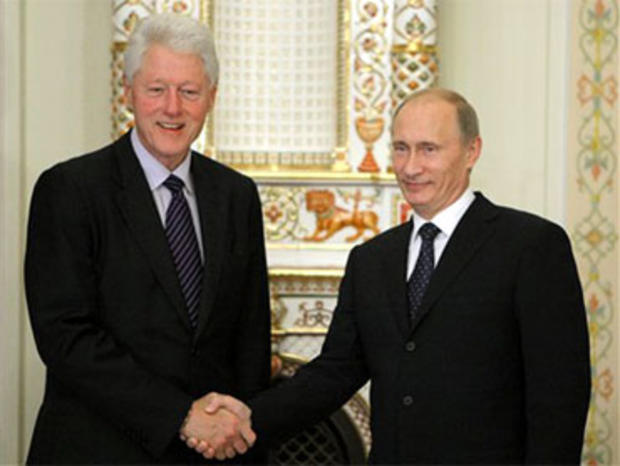Former Presidents Putin and Clinton Talk Russian Spy Arrests
Former Russian President and now Prime Minister Vladimir Putin and former U.S. President Bill Clinton met today in Moscow. The two could not avoid commenting on the recent FBI arrests of 11 alleged deep-cover SVR (the Russian equivalent of the CIA) "agents" operating in the U.S.
Putin, a former KGB (a predecessor of the SVR) officer, downplayed the significance of the incident in hope of keeping the improved relationship between the two countries on track.
"You came to Moscow at a right time. Your police got out of control and grabbed some people," Putin said, elciting a laugh from Clinton. "But this is just their job. I really expect that the positive that has been accumulated in the recent time in our international relations will not suffer, and I also hope that those people who value the Russian-American relations understand this in today's situation as well."
Clinton followed Putin, stating that he was also encouraged that "relations between American and Russia will be getting better and better. I frequently addressed our government with request to speed up Russia's entry into the WTO."
Russia has been seeking entry into the World Trade Organization for years. President Medvedev's meeting with President Obama last week resulted in an agreement that will allow U.S. exports of poultry to Russia, which had been a roadblock in Russia's WTO bid.
Igor Liakin-Frolov, deputy director of the Department of Information and Press of the Russian MID (Ministry of Foreign Affairs), maintained that Russian citizens arrested by the FBI did no harm to the U.S. and should receive access to Russian consulate officials and lawyers.
"In connection with the accusations issued by the US against a group of individuals in suspicion of intelligence-gathering activity on behalf of Russia, we state that we are dealing with Russian citizens that at varying times ended up on the territory of the United States, and did not commit any actions directed against the interest of the United States," he said. "We assume that they will be granted normal treatment in their places of detention, and that American authorities will guarantee them access to Russian consuls and attorney. We count on the American side's due understanding in this question, based among other things on the positive character of the present stage in development of the Russian-American relations."
The initial, official Russian reaction was more combative. "These actions are unfounded and pursue unseemly goals. We don't understand the reasons which prompted the U.S. Department of Justice to make a public statement in the spirit of Cold War-era spy stories," stated the Foreign Ministry on Tuesday. The SVR has yet to comment on the arrests.
Konstantin Kosachev, the head of the foreign affairs committee in the lower house, the State Duma, blamed the arrests on people who want to damage Russian-U.S. relations. "This was initiated, was done by certain people of certain political forces, who aren't in favor of improving relations between Russia and the United States, and I feel deeply sorry about that," he told Associated Press Television News.
Some question the timing of the arrests, but a Department of Justice official said, "These arrests had to be carried out Sunday for several critical law enforcement and operational reasons. Among these reasons was the fact that one of the suspects was scheduled to depart the United States and had to be arrested before departure. These operational considerations were the only factors that dictated the timing of the arrests."
The long-time surveillance by the FBI leading up to the arrests, calls into question the value of Russia's culture of spying, which was honed during the Cold War and by the KGB.
Perhaps this particular group of agents was just ineffective, but there are other unregistered foreign agents lurking in suburbia or the White House kitchen seeking to conduct espionage against the U.S. But in the 21st century, much of the information the deep-cover agents sought--such as diplomatic strategy and political analysis--could be found far more easily and cheaply by digging on the Internet.
